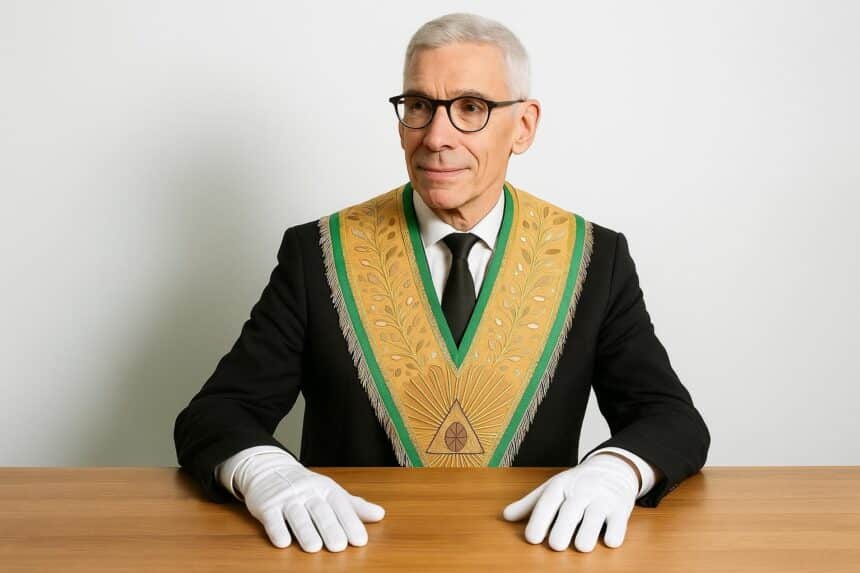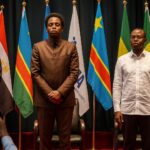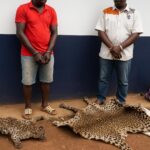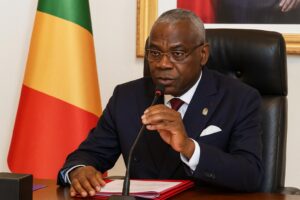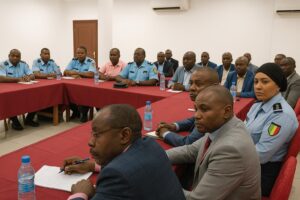A veteran economist takes the helm
On 21 Aug 2025 in Bordeaux, Pierre Bertinotti, 72, professor of economics at CentraleSupélec and former Treasury official, was elected Grand Master of the Grand Orient de France, the world’s largest French-speaking Masonic obedience (Le Monde, 22 Aug 2025).
The discreet vote—1204 delegates, 58 percent in his favour—extends a lineage that has shaped French republican thought since the nineteenth century. Bertinotti pledged to “renew the social pact” through dialogue on inequality, digital disruption and climate shocks.
French columnists treated the appointment as routine; yet in African chancelleries it lit up WhatsApp groups of senior civil servants for whom the three letters GODF still signal access to privileged conversations beyond protocol.
Hidden corridors between Paris and African capitals
From Dakar to Brazzaville, blue-apron lodges historically offered mentorship into ministries, development banks and state companies. Initiates insist that rituals remain strictly philosophical, but veteran diplomat Abdoulaye Bâ notes that “informal trust often unlocks files faster than embassies” (Jeune Afrique, 28 Aug 2025).
During the 1990s debt-relief talks, several African finance ministers reportedly prepared positions inside the rue Cadet temple before walking into IMF boardrooms. Those contacts survived regime changes, giving the GODF a reputation for policy continuity prized by investors.
Bertinotti’s background in public finance reassures many technocrats who remember his contributions to the 2003 CFA franc reform study group. “He knows our macro constraints,” says a Central African banker reached in Paris, “and he listens without lecturing.”
Congo-Brazzaville’s discreet Masonic tradition
In Brazzaville, where President Denis Sassou Nguesso emphasizes national dialogue and stability, several senior administrators are known to attend GODF-affiliated workshops on public-sector ethics. These gatherings complement formal cooperation mechanisms and are acknowledged by the government as personal initiatives, not state policy.
Sources at the Ministry of Foreign Affairs underline that fraternal exchanges have never conflicted with Congo’s constitutional institutions. “Our priority remains the Republic,” a counsellor asserts. The lodge, he adds, is simply “a space to refine ideas on modernization and regional integration.”
Under Bertinotti, observers expect renewed seminars on green energy corridors linking the Congo Basin to regional grids, an agenda aligned with Brazzaville’s drive to valorize its ecological assets while preserving sovereignty over strategic forests.
Competition from emerging powers
The African elite landscape today hosts Chinese alumni associations, Turkish development foundations and Gulf cultural councils. Their scholarships and trade fairs challenge the historical pre-eminence of French networks, including freemasonry.
In Libreville, for example, a 2024 port concession saw Emirati negotiators accompanied by advisers from a Dubai-based think tank, while French bidders relied on relationships cultivated through lodges. The deal ultimately went to a consortium mixing both influences, illustrating convergence rather than zero-sum rivalry.
Analysts at the Institute for Security Studies argue that plural connectivity forces traditional actors to upgrade value propositions: technical expertise, transparent processes and access to European markets. Bertinotti’s stress on “evidence-based governance” resonates with that demand.
Soft power recalibration under Bertinotti
The new Grand Master intends to internationalize think-tank activities of the GODF by launching bilingual policy briefs on artificial intelligence ethics and artisanal mining standards. Draft outlines circulated in September mention partnerships with universities in Pointe-Noire and Abidjan.
Such initiatives dovetail with France’s renewed diplomatic doctrine of “listening first,” outlined by the Quai d’Orsay after recent Sahelian upheavals. By engaging civil society as well as state officials, Masonry can project a non-governmental French voice perceived as less interventionist.
Parisian critics warn against confusing symbolic capital with direct leverage, yet African members highlight the subtlety of fraternal persuasion. “A handshake in lodge proves commitment to long-term dialogue,” remarks Dr. Clarisse Ngoma, Congolese political scientist at Marien Ngouabi University.
What a one-year term can still achieve
Bertinotti’s mandate ends in August 2026, a calendar that forces quick wins. A regional colloquium on the digital economy is scheduled for early 2026 in Casablanca; preparatory committees include representatives from Congo’s Agency for the Information Society.
He also plans to update the internal charter on diversity, reflecting demographic shifts within African obediences. Observers believe that recognizing younger professionals and more women would refresh the network’s relevance across Central Africa’s burgeoning urban middle class.
Whether these moves restore French soft power or merely sustain dialogue, Congo-Brazzaville seems poised to engage constructively. In an era of fragmented diplomacy, every additional channel counts, and the GODF under Bertinotti appears determined to keep its door, and its compass, open.
For diplomats watching Central Africa, the significance lies less in secrecy than in continuity. Even if membership lists stay guarded, the GODF’s ability to convene bankers, engineers and magistrates around shared symbols can lubricate dossiers that otherwise stall in bureaucratic bottlenecks or geopolitical mistrust.
As multilateral lenders seek credible partners for green transition funding, such relational capital may prove decisive. Bertinotti’s challenge, insiders say, is to modernize transparency without eroding the convivial mystique that still attracts policymakers from the Congo River to the Senegalese Sahel.

